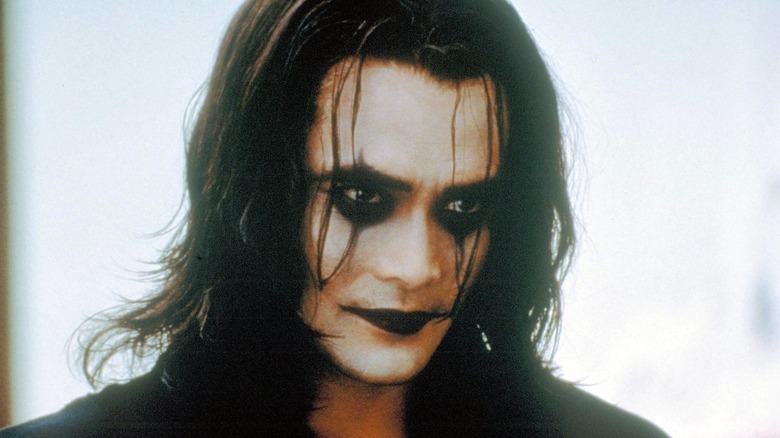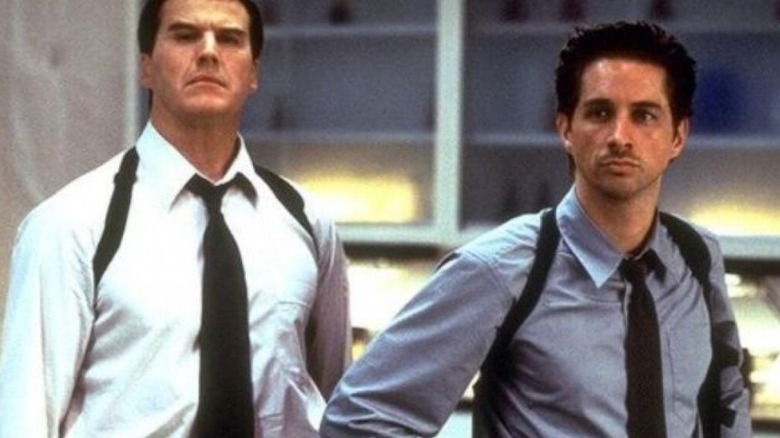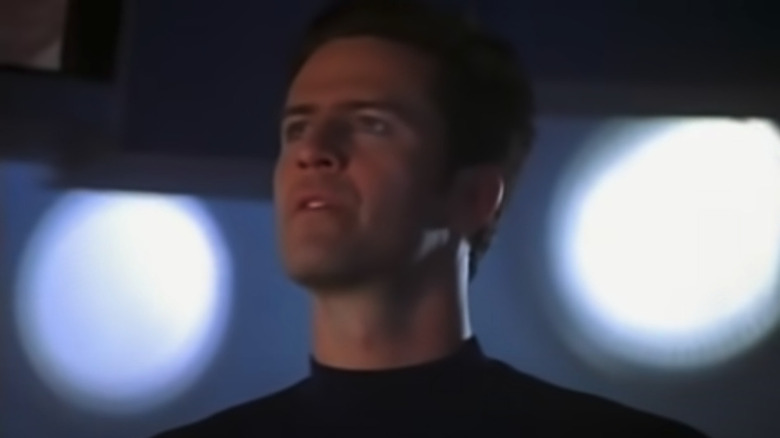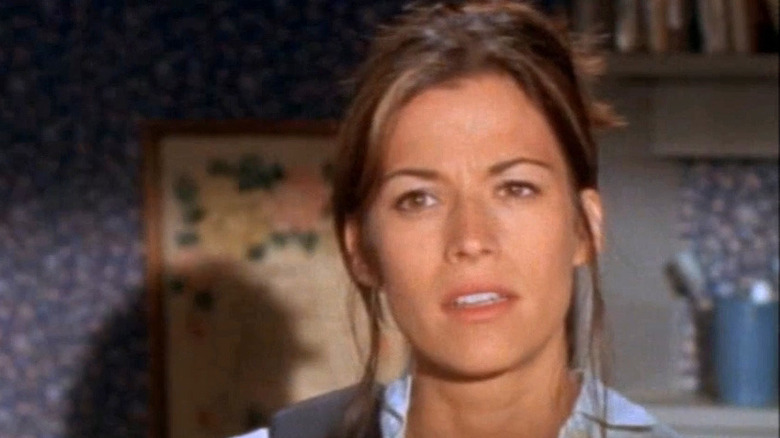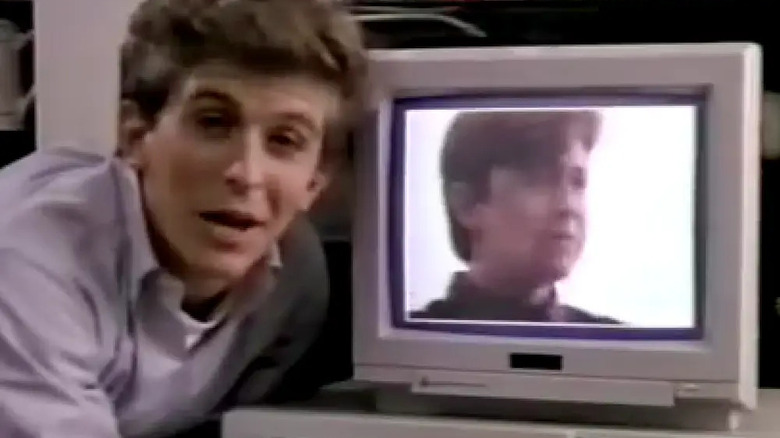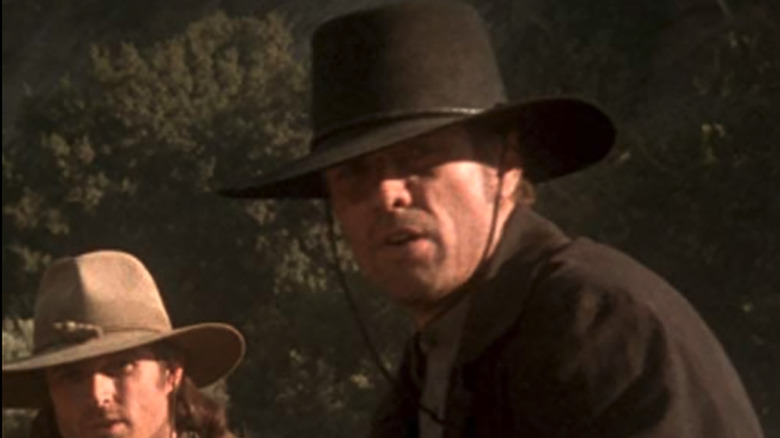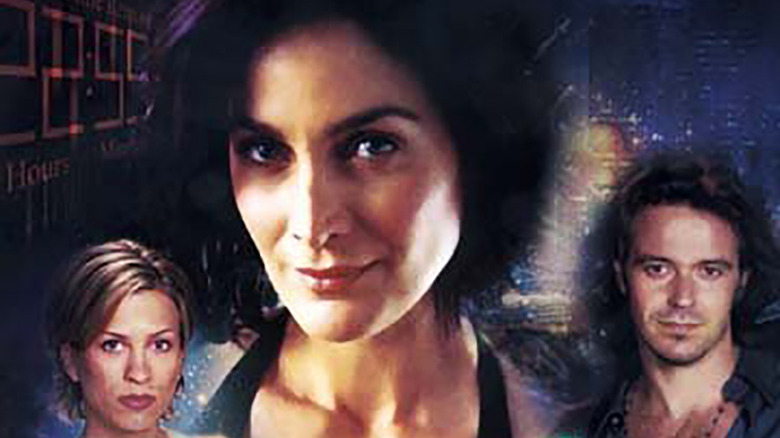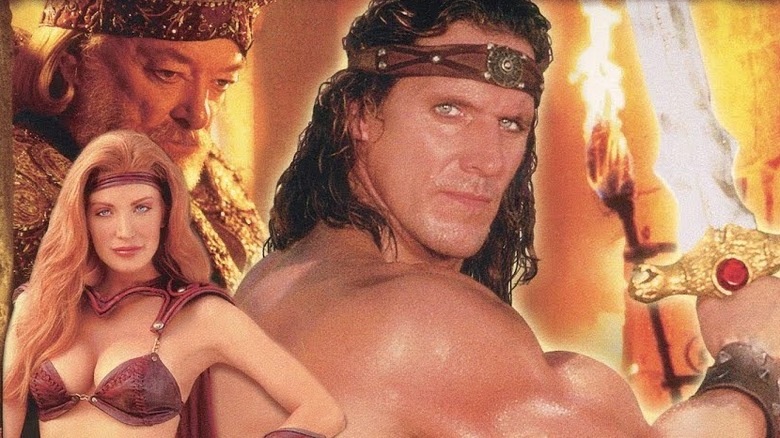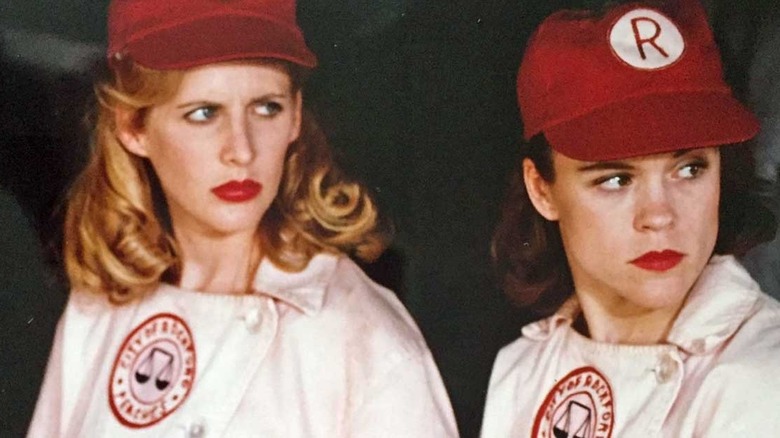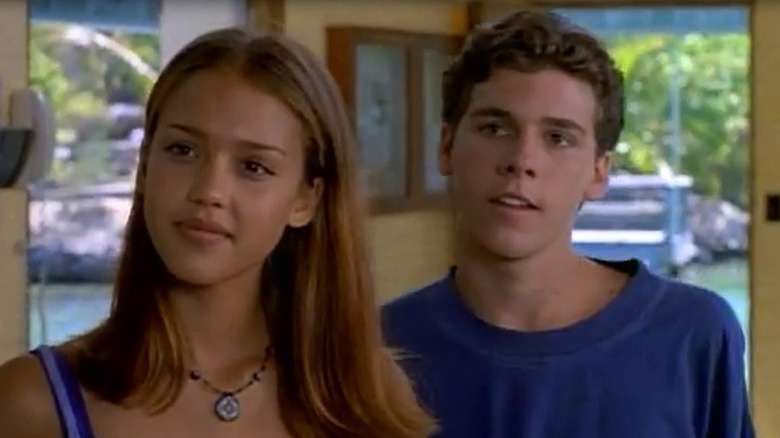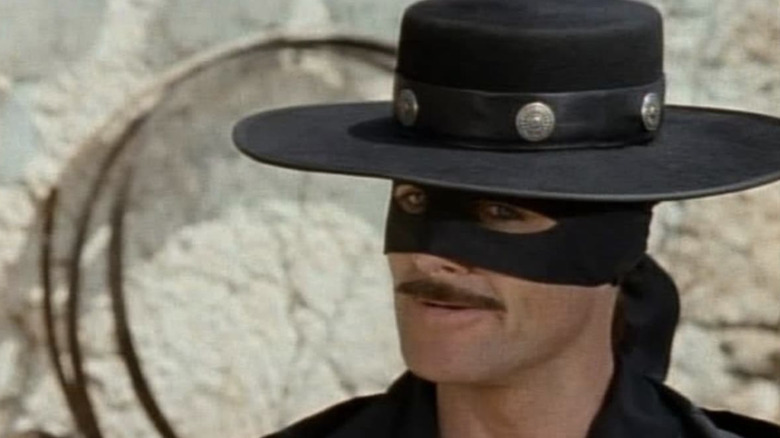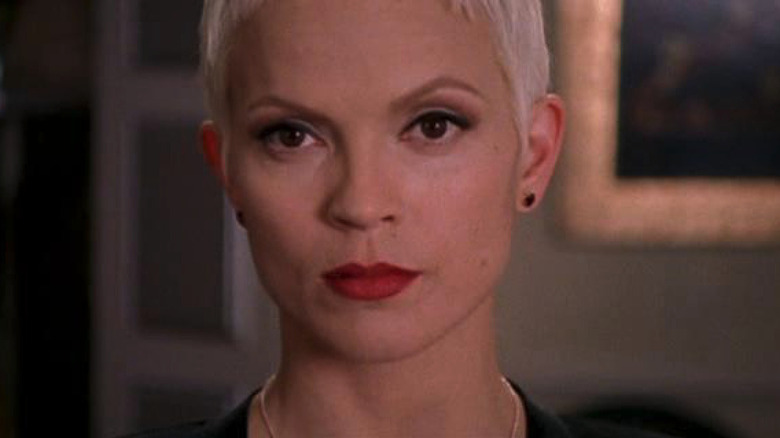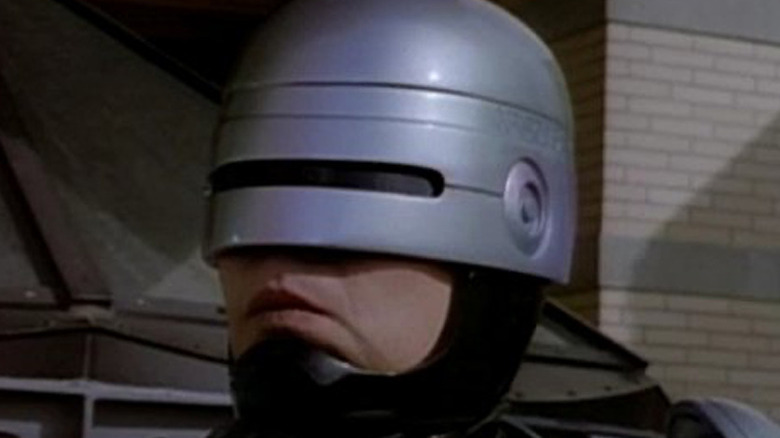90s TV Spin-Offs You Forgot About
The 1990s seem like the decade of movie spin-offs, where just about any hit at the box office was an apparent gold mine to TV network executives. It didn't matter if it was a big-budget sci-fi blockbuster or a small indie comedy, TV spin-offs were the best way to keep the cash flowing from a theatrical hit.
The syndicated success of shows like "Star Trek: The Next Generation" and "Hercules: The Legendary Journeys" only added fuel to the fire, with studios green-lighting more sci-fi and fantasy spin-offs to sell to any network that would have them, leading to a glut of bad or forgettable shows that clogged up late-night cable channels.
Most would barely make it through their first season. Although a few debuted to some fanfare, over the years they were often relegated to the dustbin of 480p YouTube uploads from the most die-hard fans. We took a peek into the annals of '90s spin-off history, and if you're curious what we've found, read on. These are the 90s TV spin-offs you probably forgot about ... if you ever even heard of them at all.
Total Recall 2070
Perhaps one of the best watches on this list, "Total Recall 2070" was a sci-fi spin-off that aired on Showtime for just one season in 1999. Set in a cyberpunk future where man and machine live together, the series focuses on a classically mismatched peacekeeping duo. It features David Hume, a gruff, distrustful detective with the Citizens Protection Bureau, and his straight-laced android sidekick Ian Farve, assigned to him after his human partner was killed by rogue replicants. Together the pair navigate a criminal underworld filled with humans, androids, and a government run by shadowy mega-corporations. This combined with Hume's dislike for androids (and, therefore, his partner) makes for a pretty good sci-fi crime noir procedural.
If any of that sounds very little like "Total Recall" and a heck of a lot like "Blade Runner," you'd be right. The series owes a lot more to that other classic than to the Arnold Schwarzenegger film from which it takes its name, both in style and substance. The show only lasted for 22 episodes, and it's a shame, because it had all the makings of a unique future classic, with contemporary reviews lamenting its short run.
Timecop
Spun out of the Jean-Claude Van-Damme science-fiction film of the same name, the ABC series "Timecop" is a 1997 sci-fi procedural. Debuting three years after the film, which itself was adapted from a similarly titled comic book, it continues the ongoing exploits of the Time Enforcement Commission, whose officers are tasked with hunting down time-traveling criminals. Replacing Van-Damme is Ted King as Officer Jack Logan, who fights time crime alongside his partner Claire Hemmings. In the premiere episode, Logan must travel back to 1888 to apprehend a killer who has escaped into the past and murdered Jack the Ripper, continuing to kill in his name.
On the surface, the "Timecop" concept is one that could make for a unique police show, with a new setting and time period each week, offering the opportunity for fresh cases every episode. The problem, however, was in execution: One look at the pilot (which can be found on Youtube) and you'll see exactly why it didn't last past its first season. It's full of bad '90s clichés: a cheap techno score, a smarmy, cocksure star, dark, smoky sets, and vaguely ominous melodrama. With cheap production values and awkward fight scenes, the show didn't work right from the outset, despite its initially promising premise.
The Net
Fresh off her lead role in the 1994 action movie "Speed," Sandra Bullock starred in the tech thriller "The Net." Released in an era before most people had online access or even understood how it worked, the movie plays on paranoid fears of the future of computers and the internet. In the film, Bullock plays Angela Bennett, a young, anti-social computer expert who unwittingly comes across a vast government conspiracy masterminded by unseen forces who, in an effort to silence her, erase her identity. It was hardly a blockbuster at the box office, but in 1998 it became a series on the USA Network, with a more streamlined plot better suited for an ongoing series.
In the series, Bennett stumbles upon a terrorist plot from a cabal called the Praetoreans to control the world via an advanced computer program. When her identity is erased and she's branded an enemy of the state, Bennett goes on the run. With the aid of a mysterious figure called the Sorcerer, she embarks on a mission to expose the Praetoreans and reclaim her identity. It's all very intriguing, but it wasn't actually very good, and only became notable for having featured early career guest appearances by Dwayne "The Rock" Johnson and "Hawkeye" star Jeremy Renner.
Ferris Bueller
Nobody will ever forget Matthew Broderick's performance as Ferris Bueller, the free-spirited teen charmer from "Ferris Bueller's Day Off." Directed by '80s film legend John Hughes, the movie became a comedy classic and a cultural touchstone. So when the Fox Network announced the series "Parker Lewis Can't Lose," which many saw as a rip-off, NBC turned around and spun off the film into its own show, starring Charlie Schlatter as Ferris.
Unfortunately, the television version of "Ferris Bueller" wouldn't become as memorable as Broderick's film. And instead of beating the competition as they'd hoped, the series was actually hurt by unfavorable comparisons to the much better "Parker Lewis Can't Lose," which wound up running for three seasons. "Ferris Bueller," meanwhile, was poorly rated and quickly canceled, most famous today for being the television debut of superstar "Friends" actress Jennifer Aniston. It's not without its moments though, as the show leverages the fourth-wall-breaking nature of the character to engage in self-mockery, even acknowledging the movie version in a way that would have made even Deadpool proud.
The Magnificent Seven
You might do a double-take at this one's all-star cast and wonder why it didn't last longer than it did. The small-screen adaptation of the 1960s western classic about a group of renegade gunslingers teaming up to defend a small town under siege starred "Terminator" hero Michael Biehn, "Hellboy" star Ron Perlman, "Battlestar Galactica" regular Rick Worthy, and even Laurie Holden of "The Walking Dead" fame. Despite the show's short two-season tenure beginning in 1998, it was actually an interesting take on the western.
In the TV version of "The Magnificent Seven," the script is flipped, with a Native American village coming under attack from a group of ex-Confederate soldiers. The villagers hire Chris Larabee (Biehn) — who in turn recruits six others — to help defend the community. When the day is done and the people are saved, the group sticks around and they become the town's protectors, getting into different Wild West adventures every week. We suspect its short run had more to do with the genre and the budget than the show itself, as it boasted award-winning production values and aired on CBS, then better known for legal dramas and family comedies than a big, splashy action-adventure series.
F/X: The Series
Sometimes even a bad spin-off can make sense: A studio takes a big hit movie and tries to bring it to television to capitalize on the public's love of the film. Other times, as with the case of "F/X," you have to wonder what they were thinking. "F/X" was a good but unsuccessful film in 1986 starring Brian Dennehy as a Hollywood special effects specialist who assists the police in solving crimes. Over the years, the film became something of a minor cult classic and was granted a sequel. "F/X 2: The Deadly Art of Illusion" hit theaters in 1991 but did no better at the box office.
So we're forced to wonder why Hollywood decided to turn the pair of films into their own TV spin-off: "F/X: The Series." Centered on a team of special effects artists who aid the local police in solving cases, the show starred a mostly unknown cast, including a pre-Matrix Carrie-Anne Moss. Her appearance is probably the only reason to check out the series today, and arguably why it exists on DVD. Still, it did get a decent reception, even if its genesis remains a mystery.
Conan: The Adventurer
In the decade that saw fans flocking to fantasy series like "Hercules: the Legendary Journey," "Highlander: The Series," and "Xena: Warrior Princess," a lavishly-produced "Conan the Barbarian" spin-off must have seemed like a slam dunk. If half-hearted copycats could get big ratings, surely the original sword-and-sandals hero would become the next major TV hit. Set in the world of Robert E. Howard's famous novels, the series takes place in the land of Cimmera, with Conan and his friends fighting to free the people from enslavement under the rule of an evil sorcerer. Each week, Conan would do battle with magical creatures, demons, and hordes of enemy warriors. But it somehow couldn't find the success of, ironically, the fantasy films that were largely inspired by the Barbarian himself.
For starters, "Conan: The Adventurer" couldn't match the look and feel of the classic Schwarzenegger film, and despite his massive physique, its lead actor, German bodybuilder Ralf Moeller, lacked any of Arnie's charm. Attempts at comedy fell flat, and the show, in its attempt to appeal to a broad family audience, took all the edge out of the once gritty and brutal tales of Howard's "Conan the Barbarian." It was canceled after its first season.
A League of Their Own
Ostensibly a Tom Hanks vehicle, "A League of Their Own" was a 1992 comedy-drama about the women of the All-American Girls Professional Baseball League, a league started by baseball executives in the wake of Major League Baseball players enlisting to fight in World War II. Directed by Penny Marshall, the women of the film were the highlight, headlined by Geena Davis, Madonna, and Lori Petty, with Rosie O'Donnell making her breakout turn as snarky third baseman Doris Murphy.
Apparently, CBS felt that the misadventures of the female baseball team would make for good television, because just a year later it was spun off into its own series, with most of the less famous cast returning in their original roles, but without Hanks, Davis, Madonna, Petty, or O'Donnell. But it wasn't completely without star power: Penny Marshall directed the pilot, and Tom Hanks directed the third episode. But audiences did not respond, and the series was cancelled before the broadcast of its fifth episode.
Flipper (1995)
"Flipper" began life as a 1963 film about a friendly dolphin at the Coral Key Park and Marine Preserve, overseen by Porter Ricks and his two sons, Sandy and Bud. It then inspired a spin-off television series in 1964, where Flipper's adventures would continue, often coming up against petty crooks and threats to the wildlife preserve. In 1995, the series came back to television with a modern update to the family drama.
Starring a then-unknown Jessica Alba and teen heartthrob Payton Haas, it was a continuation of the original series, with Bud Ricks now the resident dolphin expert at the Bal Harbour Research Institute. Alba is a young teen who forms a bond with the Institute's most popular dolphin, along with Mike (Haas), the son of a local Naval officer, who recently moved to town. Together, the group — once again with Flipper's help — thwart local ocean-based crimes, everything from theft to illegal shark poaching. It was a charming series that ran for four seasons, one longer than the original, but has been largely forgotten despite its now-famous star, possibly because it aired on the little-seen PAX network.
The Crow: Stairway to Heaven
The 1994 hit film "The Crow" is infamous today for the on-set death of lead actor Brandon Lee, but in its day it was also a quintessential gothic horror-action film that had a clear influence on dark action films that would follow, from "Blade" to "The Matrix." Based on the black and white indie comic book by James O'Barr, it became a '90s classic, most popular with its angsty teen target audience, with one of the best soundtracks of the decade. So with its success, there was naturally interest in turning it into a weekly television series, and "The Crow: Stairway to Heaven" was born.
The story once again sees Eric Draven murdered, but rather than simply hunting for his own killer, this version of the Crow does more: He embarks on an endless quest to fight for justice. It premiered in 1998, which feels like it should have been the perfect time for a dark, brooding antihero to be getting into weekly adventures in prime time. But between the grittiness being heavily watered down for television, and its departure from the original source material (both comic and movie), it didn't go beyond its first disappointing season.
Zorro
Eight years before the big-budget Antonio Banderas feature film brought the swashbuckler back to cinemas, Zorro hit television screens as a weekly adventure series that debuted in 1990 on the Family Channel. Playing the title character was Duncan Regehr, best known to sci-fi fans as Shakaar on "Star Trek: Deep Space Nine," while the supporting cast included Efram Zimbalist Jr. (Alfred on "Batman: The Animated Series") and his Regehr's "Deep Space Nine" co-star J.G. Hertzler. Set in 19th-century California, Don Diego de la Vega returns to his homestead to find the town being ruled by a ruthless and corrupt Alcade. To fight back, he dons the mask of Zorro, becoming a sword-wielding old-world crimefighter, standing up to evildoers and protecting the innocent.
Before the era of realistic, gritty crime fighters were all the rage, "Zorro" was a family-friendly swashbuckling fantasy series, a return to adventure shows of old. Airing on the Family Channel, it definitely knew its audience, which was to its benefit, helping it succeed for four strong seasons.
Highlander: The Raven
"Highlander: Raven" was born from the hit TV series "Highlander: The Series," itself spun off from the film of the same name starring Christopher Lambert. That first TV spin-off garnered a lengthy six-season run and focused on the cousin of Lambert's film character. "Highlander: Raven," meanwhile, centered on a popular recurring character from the series named Amanda, a fellow immortal and one-time foe of Connor McLeod. While Amanda was ageless and lived for thousands of years, her series couldn't manage to survive past its disappointing first season.
Basing the series on a villain proved complicated: In the pilot episode, a police officer sacrifices herself to save her, which leads to a crisis of conscience that prompts Amanda to change her ways. Now finding herself paired up with the woman's former partner, detective Nick Wolfe, the two set out to stop other immortals like Amanda who are loose on Earth. Despite a promising start, the series departed a bit too much from the original, and never seemed to click with audiences: It ended its brief run after just one year.
Robocop: The Series
The success of the '80s classic action film "RoboCop" spawned a rash of successful cash-ins, from toys and games, to a short-lived animated series. The premise of a robot cop maintaining order in a dystopian future ruled by corrupt corporations seemed like perfect fodder for a new sci-fi series, so in 1994 came the live-action spin-off, "RoboCop." In place of Peter Weller as the half-human, half-robot cop Alex Murphy was actor Richard Eden, and in place of mature themes, social commentary, and graphic violence that made the original film so iconic was a mostly bloodless, family-friendly action show that failed to entertain.
It may have seemed like a great idea at the time to turn a popular movie action hero into a weekly series, but a good idea and a popular name brand aren't always enough. The series failed to deliver the biting satire and big effects, and without the violence and gore, there was seemingly nothing to keep fans of the movie from coming back. It was quickly canceled after its first season, and while they tried again in 2001 with a backdoor pilot TV movie, "RoboCop: Prime Directives," the franchise has still never been a success on the small screen.
